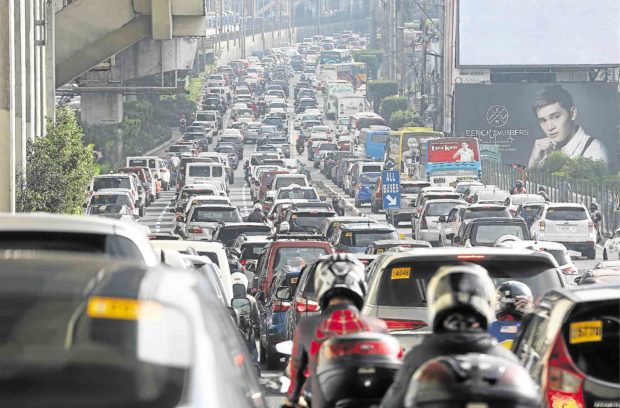
The ‘parking lot’ that is Edsa during rush hour. INQUIRER FILE / NIÑO JESUS ORBETA
Several senatorial candidates eye the development of mass transport and the decongestion of Metro Manila and other major urban centers as solutions to the country’s traffic woes.
In a televised forum by CNN Philippines Sunday night, eight Senate hopefuls were asked what they plan to do to solve the country’s traffic problem.
Former presidential political adviser Francis Tolentino said he would push for the passage of the national land use plan act to help with the urbanization of potential “growth centers” in the country.
“Yung traffic ngayon sa Metro Manila will happen in Cagayan de Oro, Cebu and other urban growth centers, including Tuguegarao in the North. Kailangan ma-plano natin ang urbanization because of the density and the sheer volume of people inside an urban center,” he said.
Re-electionist-Senator JV Ejercito said he would propose a railway system that would connect different parts of the country in an effort to decongest Metro Manila.
“I would still push for railway system massive infrastructure. Because I believe that railway is the only way,” he said.
“I believe that if we are able to lay down the tracks from the PNR going all the way to North, to La Union, and Ilocandia, and all the way to South to Bicol and the Mindanao railway system, all the provinces that will have a railway station will be potential growth development areas,” he added.
Meanwhile, former senator Sergio Osmeña proposed for more open road connections in Metro Manila.
“Sa Metro Manila lang hindi konektado ang ating mga roads because we have too many protected environments like the Forbes Park. Hindi pwede ang ganun because this blocks the way to other roads. We can only go to Quezon City by going to either España or EDSA or C5, that’s all,” he said.
“We cannot do that, we have to open up all the roads so that we can go through any other roads, so when there’s blockage in one, like for example EDSA, pwede tayo dumaan sa Mandaluyong o sa Shaw Boulevard, so we really have to redo these whole thing so that we can open up at least part of the gated communities,” he added.
For former Senator Juan Ponce Enrile and Magdalo Rep. Gary Alejano, decentralizing Metro Manila can help decongest the country’s nerve center.
Enrile proposed that the government build economic centers outside of Metro Manila to disperse economic activities outside of the city.
“The problem of Manila is it’s too congested, all developments are being done in the core territory of the Philippines, which is dangerous from a security viewpoint and many other things. What we should do is decongest Metro Manila,” he said.
“Create economic centers outside a radius of 100 kilometers from the center of the city to pull out employment out of our core’s territory,” he added.
Meanwhile, Alejano suggested the transfer of the country’s seat of government outside Metro Manila.
“Economic activities attract people. So kung saan may economic activites, nandun sila, sumusunod ang tao. Natural magnet na yan. Dapat ilipat natin, susunod ang tao,” he said.
“We have to move our seat of government outside of NCR. We should develop economic hubs para ma-disperse ang economic opportunities sa ating bayan,” he added.
However, for human rights lawyer Chel Diokno, the government should prioritize those who suffer the dreaded daily commute in Manila and approach the traffic problem as a matter of “moving people, and not moving vehicles.”
“Ang dapat mabigyan ng prayoridad ng ating pamahalaan ay yung mga sumasakay ng bus at jeep sa atin. Hindi yung mga nakasakay sa mga magagarang kotse,” he said.
Diokno also proposed that the government look into establishing “carless cities.”
“In other countries, they are already thinking about establishing carless cities, where we travel inside our cities by bicycle, on foot that provides clean air, that makes us healthier,” he said.
“Palagay ko panahon na rin para pag-isipan natin yan. Sobra-sobra na ang sasakyan sa atin. Ang dala-dala pa nila ay polusyon,” he added.
For former Philippine National Police (PNP) and Bureau of Corrections (BuCor) chief Ronald “Bato” Dela Rosa, he would push for a reform in the country’s traffic enforcement.
He cited a point system in Hong Kong to ensure discipline in drivers.
“Gusto ko sanang gayahin yung ginagawa ng Hong Kong about traffic enforcement wherein isang driver ay binibigyan lang ng 15 points na consumable within two years. Yung 15 points na yan, kapag ikaw ay nag-violate ng traffic law, like for example overspeeding, minus three points. Drinking under the influence of liquor? Six points. Hanggang maubos mo yung 15 points consumable mo within two years, bago matapos ang two years pag naubos mo na yan, you have to undergo seminars sa LTO (Land Transportion Office) para continuous yung education mo,” he said.
“Kaya makita mo sa Hong Kong, walang ka-traffic-traffic kahit Hong Kong is considered to be one of the densely populated cities in the world,” he added.
Senator Bam Aquino agreed with the proposals of the other candidates on mass transport, infrastructure development, proper enforcement but said that the next step should be a corruption-free implementation of these projects.
“Palagay ko alam na natin kung ano yung kailangang gawin. Hindi na ito guesswork, napagaralan na ito, kailangan na talagang maimplement,” he said.
“Ang kailangan handa yung taumbayan na subaybayan itong mga proyektong ‘to, siguraduhing walang korapsyon, mapupunta talaga yung infrastructure sa tamang lugar. Walang patong, walang mga kickback diyan. And we hope mabantayan ng taumbayan bawat proyekto na gagawin upang ma-solve yung traffic sa ating bansa,” he added. /cbb